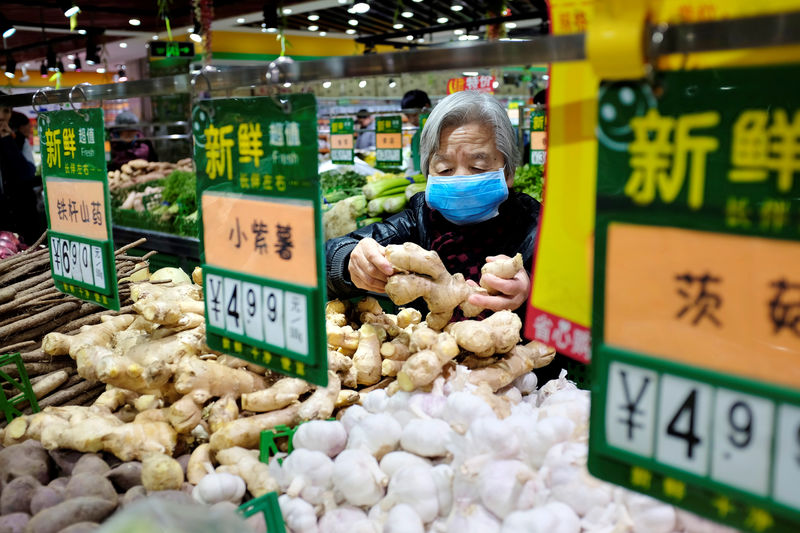BEIJING (Reuters) - China's producer and consumer inflation eased as expected in January, even as global stock markets nosedive on fears that price pressures are slowly building in the United States and Europe.
A moderation in Chinese inflation would support the view that the world's second-largest economy is slowly starting to lose momentum after forecast-beating growth of 6.9 percent in 2017.
But data from China early in the year must always be treated with caution due to business and price distortions caused by the timing of the long Lunar New Year celebrations, which fell in late January 2017 but start in mid-February this year.
China's producer inflation eased for a third straight month in January and by slightly more than expected, official data showed on Friday, suggesting last year's strong profit growth in its industrial sector may start to fade.
Lower revenues could impair Chinese firms' ability to service a mountain of debt as Beijing works to reduce risks in the financial system.
The producer price index (PPI) rose 4.3 percent in January from a year earlier, the smallest rise in 14 months and compared with 4.9 percent in December.
Analysts had expected a reading of 4.4 percent, citing milder price rises for raw materials and finished goods like steel.
On a monthly basis, the PPI rose 0.3 percent in January, less than half the pace seen in the previous month.
CONSUMER INFLATION ALSO MILD
China's consumer inflation also eased to the lowest since July 2017.
The consumer price index (CPI) rose 1.5 percent from a year earlier, in line with expectations and slowing from December's gain of 1.8 percent, the National Bureau of Statistics (NBS) said.
On a month-on-month basis, CPI rose 0.6 percent in January.
The food price index declined 0.5 percent from a year earlier due to a higher base last year, after falling 0.4 percent in December. Non-food prices rose 2.0 percent, compared with 2.4 percent in December.
The milder inflation readings are somewhat at odds with strong import and export data on Thursday, which suggested China's economy largely retained its momentum or possibly even picked up a step at the start of the year.
But analysts said the softer January price data by itself did not suggest the economy is at risk of a sharper slowdown, as it can be too skewed by seasonal factors. Indeed, the consensus view is that China will see only a modest pullback in GDP growth to 6.4 percent this year.
"It's really a mathematical game due to the base effect," said Tommy Xie, a Singapore-based economist at OCBC bank, adding that January could be the last month that CPI was below 2 percent this year.
"In terms of the economic growth, I think the latest trade data actually points to extended growth momentum."
While last year's higher producer prices are expected to percolate down to the consumer level eventually, sources have told Reuters that China's government will maintain a 3 percent consumer inflation target for 2018.
That suggests policymakers are not foreseeing any sharp retail price rises that could force the central bank to change course and tighten policy more quickly.

Global stock markets began to tumble last Friday after a healthy U.S. labor market report sparked fears of rising inflation which could trigger more central bank rate hikes.